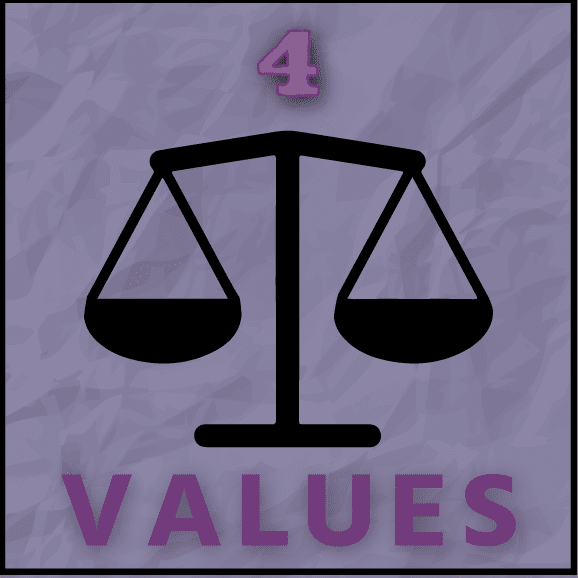Values are the guiding principles by which we live or, at least, they are aspirations that help us align our actions with our principles. Without values, we would be living in an immoral or amoral world of interpersonal confusion and existential chaos. At the same time, too strong an adherence to our values can create a counter-effect of personal and interpersonal difficulties. And too strong an identification with these values keeps our type structures in place, thus inhibiting our growth potential.
Enneagram 4s emphasize three important values: beauty, authenticity and creativity. They often think or say the following: “I crave that which is adds beauty to the world.” “Authenticity in everything you do is essential; you must be your authentic self.“ “Creativity is a state of mind and state of being. Do something different.” Enneagram 4s also pursue self-expression, deeper meaning, symbols and symbolism as they try to both find and pursue their true path.
These three values – beauty, authenticity and creativity – support the Enneagram 4 “ego ideal” of being the “original person,” a person who is different, unique, special or, in other words, one of a kind. The “ego ideal,” according to Enneagram author and teacher Jerry Wagner, is the idealized self that people use as a positive definition of self, a partial answer to the question “Who am I?”
The issue is that while our type-based values are positive ones, we can hold onto these values so tightly and narrowly – after all, our idealized self depends on our firm belief in these principles – that these values can become impediments to our growth.
Beauty
A world filled with beauty, aesthetics, and extreme attractiveness can be thrilling and deeply satisfying. Whether it is food, home, environment, art, music, architecture, parenting, work, clothing or more, who wouldn’t benefit from the pleasure of refined beauty? So what is the down side for Enneagram 4s? An extreme emphasis on beauty has multiple challenges: beauty is often subjective and one person’s view of what is aesthetic may not align with another’s, thus setting up 4s for potential disappointment should the 4 create something that others do not affirm; 4s can put unrelenting pressure on themselves to constantly live their lives in a state of heightened aesthetics; and 4s can lose sight of the value – and even beauty – in that which is simple and simply elegant.
Authenticity
Being authentic and living an authentic life is a value to which many people aspire. This involves being real, being true to yourself and your values – and knowing what these are – plus letting down your mask, being vulnerable, being fully present, knowing your true feelings at almost all times, and more. This is a very tall order! Here are some of the dilemmas 4s experience from being so focused on authenticity: 4s end up engaging in a non-stop search for the answers to the question of authenticity and because this journey goes deeper and deeper, the search is endless; 4s become dissatisfied when they can’t quite accomplish and or complete this pursuit of authenticity, thus disabling them from actually accepting “what is;” and because 4s have a shifting interior landscape, their sense of a firm or constant authenticity becomes challenging.
Creativity
4s perceive things differently from most people, but they also perceive things differently from one another. No 4 is like any other 4. A world without creativity would be a less glorious and less exciting world. But 4s can emphasize creativity to such an extent that they can overdo their efforts for the sake of being original when something more practical would be more effective. 4s can also work so hard to put their own personal experience in universal terms, when it is really only personal and not universal. When this happens, 4s get deeply disappointed, feel misunderstood, and can even become angry at others or at themselves.
Summary
Values are the foundation of civil communities. Type-based values are organizing principles for people of each type. However, when our values are held too tightly, they limit our development.
Ginger Lapid-Bogda PhD, the author of seven Enneagram-business books, is a speaker, consultant, trainer, and coach. She provides certification programs and training tools for business professionals around the world who want to bring the Enneagram into organizations with high-impact business applications, and is past-president of the International Enneagram Association. Visit: TheEnneagramInBusiness.com | ginger@theenneagraminbusiness.com



